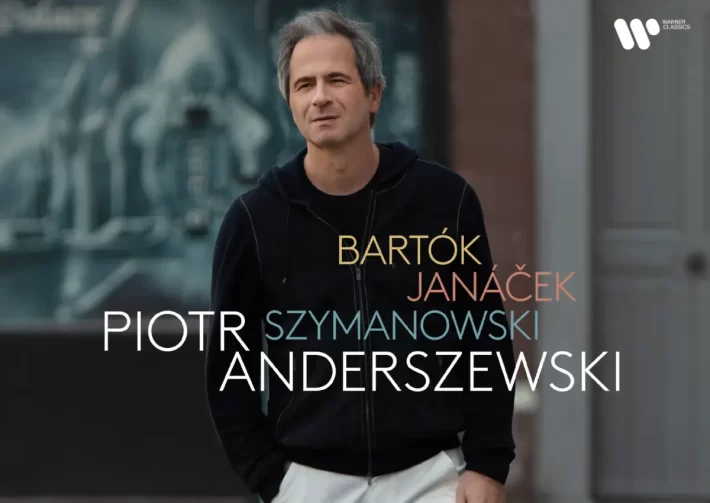On his last album which I reviewed in 2021, Piotr Anderszewski tackled the challenges of performing Bach’s Preludes and Fugues by creating his own curated ‘cycle’, which I thought was insightfully conceived and presented. He aims to capture the “spirit of rebellion” on this new release through the voices of three composers: Bartòk, Szymanowski, and Janáček.
In a rather poetic forward, the pianist highlights the most captivating qualities of each composer; for Janáček, that is a “direct connection of the essence of the Slavic soul at its most generous.” A striking description, but how does one translate this into sound? The entire On an Overgrown Path cycle spans 15 works across two series, though Anderszewski chooses to present only Series II. The opening Andante (track 1) is steeped in a perpetual veil of mystery: via the mysterious, hazy harmonies to the couple of passionate outbursts, he captures the element of unpredictability—a marked and interesting difference of interpretation from Lars Vogt. The late Vogt, in an equally effective rendition, chooses to diffuse uncertainty throughout the entire work with more whispery pianos and nervous energy.
The aforementioned ‘generosity of soul’ comes through the best in the Vivo (track 3), which sounds almost eccentric with its mood swings: Anderszewski adds an element of brashness to the recurring opening theme, though I did find that his eagerness resulted in an overly-harsh tone on a few occasions. However, the off-kilter, giddy dotted rhythms adds a nice reflection of the work’s caprice. The Allegro (track 5) proves the most outgoing, but again I wondered if the chords and accents needed to be hit that hard, even if we are talking about an indomitable spirit — maybe he was trying to express the work’s vitality, but I found myself jumping uncomfortably after each strike.
Related Posts
- Review: Szymanowski – Piano Works – Krystian Zimerman, Piano
- Review: “Diffusion” – The Verona Quartet Play Janáček, Szymanowski and Ravel
- Review: Bartók – Piano Concertos Nos. 1-3 – Aimard, Salonen
The Szymanowski set includes 6 of his Mazurkas, Opus 50. In No. 3 (track 6), the performer’s mellow tone complements the composer’s complex and harmonic language in a sensible balance between the piece’s atmospheric and dance-like qualities. Rebellion takes the form of madness which permeates the No. 10 Allegramente (track 9). If the goal was to create cataclysm and fury (which totally makes sense here), then the pianist has certainly fulfilled it. The Moderato (track 10) combines the folk aspect of the dance with touches of polytonality and angular atonality to create a stark and forbidding sonoric landscape. While the music itself isn’t tumultuous per se, Anderszewski’s evocative performance leaves us with something between contemplation and disquietude.
Most of the 14 Bagatelles by Bartòk may be miniatures but are full of unique character. The Allegro giocoso (track 13), for instance, is impish and sardonic while the following Andante explores the macabre in more subtle fashion (listen for the pianist’s slinky chromatic ostinato and haunting melody). The Grave (track 15) offers a brief and rare moment of tonality on the disc: chords are nicely voiced to preserve the melodic line, although Anderszewski could create a more ‘open’ sound that allows the harmonies to reverberate. One of the best is Rubato (track 23); I found this one particularly interesting because he pays plenty of attention to the smallest details. Each repeated note is clear as a bell and the tone clusters in the middle of the work have just the right shade of haunting character and transparency. Although there are only a couple iterations, their eeriness lasts long after the last note.
The program embodies the spirit of the intended theme, but the hour or so of music centered very much on a dark, ominous side of rebellion. Perhaps a few ‘lighter’ works that speak to the same concept might have given the listener some respite and accentuate through contrast the moods presented. The pianist’s notes that were mentioned above are a nice read, but for a program that consists of works that are not the most salient in the piano repertoire, a musical and historical context is sorely missing.
All things considered, this is still an interesting album that plays to Anderszewski’s strengths especially in musical nuance—but maybe not one I’d revisit all that frequently.

Bartók, Szymanowski, Janáček
Piotr Anderszewski – Piano
Warner Classics, CD 5419789127
Related Albums
Complete Szymanowski Mazurkas- Hamelin | Selected Szymanowski Mazurkas- Jablonski
Janáček On an Overgrown Path – Schiff | Janáček On an Overgrown Path (Series 1) – Andsnes
Included with an Apple Music subscription:
Read more classical music reviews or visit The Classic Review Amazon store












